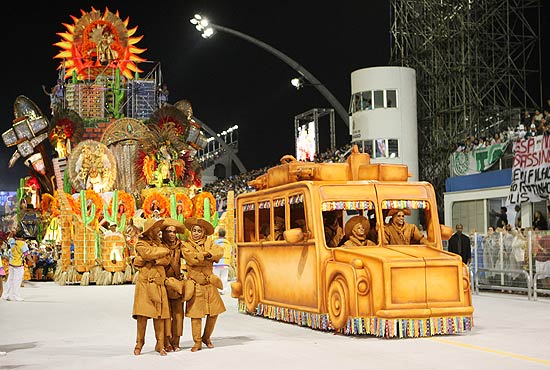Through all the color and pageantry of seven samba schools competing for the top prize on the first night of São Paulo’s Sambadrome competition, one dark and controversial issue reared its head in the most beautiful and touching ways. The Acadêmicos do Tucuruvi samba school (less a school in the traditional sense than a Carnival parade organization) chose to honor migrants from Brazil’s Northeast as their theme for this year’s competition: São Paulo, Capital of the Northeast. They received threatening emails because of that choice.
See, the Brazilian Northeast is basically the cultural and historical equivalent of the American South – a former slave-holding society with some of the worst quality-of-life indicators, including famine, poverty, illiteracy, malnutrition, and teenage pregnancy. Because of these ills, millions of nordestinos (Northeasterners), particularly from the drought-stricken zones of the interior, migrate first to cities like Salvador, Recife, Fortaleza, and Natal before trekking thousands of miles to the industrial centers of the Southeast, most notably, São Paulo. Here, they work as maids and construction workers, nannies and security guards. They are almost invariably mixed with African and indigenous blood, and those who come from the worst situations are typically shorter because of nutritional deficiencies during their childhoods.
Many nordestinos inhabit the slums on the outskirts of town, spending two hours, one-way, on public transportation to get to their minimum wage jobs. They are often referred to as “lazy,” “stupid,” and “slow,” and are often associated with an increase in crime. “Nordestinos” were to blame, according to many conservative paulistanos, for Dilma succeeding Lula (incidentally, a nordestino) as president of Brazil, evidenced most dangerously by a pea-brained law student who Tweeted that people should just “kill a nordestino.” “They live in packs. They’re dirty. They play loud music all the time and whenever there’s two of them, there’s a party.” Hm, that last one sounds like the stereotype of all Brazilians to me.
And it’s this hypocrisy that most annoys me about the whole nordestino issue, as if the immigrant ancestors of 80% of São Paulo’s population came to the city because they enjoy smog. They came here – from Italy, Portugal, Germany, Spain, Japan, Syria, Lebanon – to escape famine and poverty in their own countries, helping to swell the city proper’s population from 300,000 to 11 million in a century, and now want to deny that same opportunity to others. They seem to forget the fact that even the original Portuguese settlers were the second sons, criminals, miscreants, outcasts, and other assorted ne’er-do-wells from the old country. Let’s not get it twisted.
Acadêmicos do Tucuruvi courageously honored a demographic that suffers from harsh generalizations and broad discrimination on top of the physical and mental damage done by poverty. They honored it with floats depicting folkloric Brazilian art and gastronomy (all of which stems from the Northeast) and the city’s main cathedral as seen through the eyes of a recently-arrived migrant. They honored it with costumes depicting weary parents trekking thousands of miles to provide better lives for their children, folkloric festivals that are popular throughout the country, and the various musical rhythms Brazil is known for. They honored it in the touching lyrics of their samba:
Sou cabra da peste
Vim lá do Nordeste
São Paulo é minha capital
Levando alegria, eu vou por ai
Eu sou valente! Sou Tucuruvi!
Loosely translated:
I’m a bold, brash mofo
Come from the Northeast
São Paulo is my capital
Bringing happiness, I’m headed there
I’m valiant! I’m Tucuruvi!
Hearing the song over and over again as beautiful, multi-hued paraders reveled in a culture that grew over the centuries from regional to national, watching clay-covered migrants playfully sputtering through the Sambadrome in a rickety old bus with suitcases on top, I felt a wave of recognition and understanding wash over me. As a black man, a Southerner, an immigrant, an expat, an American, I know what it’s like to be stereotyped and unappreciated, even as my culture is being appropriated by the very people who revile me. I choked up for a minute and, standing in the middle of all the frenzy and glee taking place in the Brazilian city with the largest population of nordestinos, the city I love, I felt a couple of tears. The very last line of the samba: “Reconheço meu valor.”
“I recognize my worth.”
Bless you, Acadêmicos do Tucuruvi.
For still photos, click here.


Thank you Fly Brother. I enjoy reading your blog and watching the videos. Your comments were very educational. I have been to Salvador de Bahia and Rio. I would someday like to visit Sao Paulo. What is the crime like in SP, is it like Rio? This is the only problem I have with visiting Brazil.
Thank you for writing this story. I enjoyed it’s message and the education I received from it.
Beautiful post. In the places I have traveled to I have also felt a connection with marginalized, on-the-perimeter-people. I long to visit Brazil..hope to travel there this summer. I wonder about how I will be received ( until I open my mouth and reveal my US-ness. )
Tenho muito saudades do Brasil e do Carnaval!